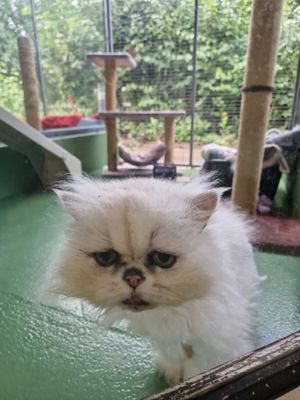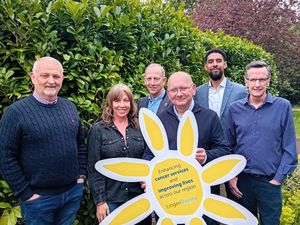Suffering short-nosed cats highlight the problems these lovable animals face
The RSPCA is highlighting the breathing issues that 'flat-faced' cats suffer from every day.

New figures reveal that there has been a 92 per cent increase in Persian cats coming into the charity’s care from 2018 to 2022, as the popularity of the cats booms.
Two of the cats are currently at the charity's Gonsal Farm Animal Centre near Shrewsbury after their owners could no longer care for them.
Molly and Heathcliff are being cared for while the RSPCA looks for new homes for them.
Persians are now the most common pedigree breed found in RSPCA care, likely due to their popularity on social media and their use in advertising.
They and other breeds, British Shorthairs, Himalayan, Exotic Shorthairs and to a lesser extent Birmans can suffer from brachycephalic airway obstructive syndrome, struggling to breathe, suffering from eye problems, having difficulty sleeping and grooming themselves, and even suffering complications when giving birth.
Figures from the Governing Council of the Cat Fancy (GCCF) suggest that British Shorthair breeds are also on the rise with a 66 per cent increase in registrations over the last 10 years.
Alice Potter, RSPCA cat welfare expert, said: “Unfortunately, Persians and other flat-faced cats have become increasingly popular as people think the physical attributes, which in reality cause them to suffer, are ‘cute’. While we know many people love these cats and are very caring owners, breeding for features which compromise basic health and welfare is wrong.
“These cats can suffer from eye problems and other issues, and they often struggle to do the most crucial thing we all need to do to survive - breathe. This can be scary and debilitating and in some instances can make eating, climbing, playing, and all the things our cats naturally love to do a daily struggle.
“We want to see breeders prioritise the health and welfare of the animals and not breed them for traits which sadly can cause them to suffer. We also need to raise awareness of the physical attributes which compromise their welfare to the wider public too.”
The RSPCA has launched the next stage of its Save Our Breath campaign which aims to raise awareness of the struggles the cats experience.
Alice said seven-year-old Molly was sadly given up by her owner who could no longer cope with caring for her. Her breathing is incredibly raspy and she has a history of repeated eye problems. "The shape of her face also means she finds it difficult to eat at times. However, Molly is a sweet-natured girl who is quietly affectionate and enjoys a forehead tickle.
"She is currently looking for a home and will need owners who are experienced with either Persians or long-haired brachycephalic cats and especially coat care as she needs regular grooming. Thankfully, Molly enjoys being groomed and so this will make life easier as it will need to be done regularly and is a great way to bond with her.
"She could live with children aged 13 or older, who can respect her independent nature. She would also like to be the only pet in the home. Molly would like the option to explore outside, and needs an owner willing to give her all the care she needs, and deserves."
Heathcliff is a 12-year-old boy who came into the charity’s care as his elderly owner could no longer care for him. He also has to have daily eye cleaning and struggles to eat.

"Although he is an older chap, Heathcliff doesn't let that stop him having some fun. He enjoys new toys and particularly loves catnip. Like Molly he has some specific needs when it comes to eating but other than that he copes well and is a happy-go-lucky type of guy. He will be looking for a home very soon."
The RSPCA is now urging the public to contact their MP to raise awareness of this issue and start critical conversations to help protect these breeds. For more information, or to contact your local MP, visit rspca.org.uk/getinvolved/campaign/.





